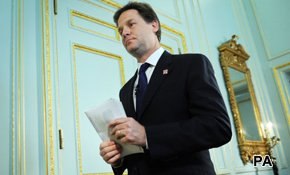What future for the Coalition, asks John Humphrys, amid reactions to Clegg Lords decision
August is (or, some would say, ought to be) the least political month of the year. Many people are away on holiday and quite a few of those who aren’t fervently hope that politicians will be. It gives us all a break. When there are also the Olympics to distract us, politics will be on very few people’s minds.
But Nick Clegg’s speech this week means the subject can’t be just wished away, for the very future of the Coalition Government, of which he is the Deputy Prime Minister, now seems to hang in the balance. What’s going to happen? And what should?
The Liberal Democrat leader announced that plans to reform the House of Lords were going to be shelved until after the next election. This was not because of any lack of enthusiasm on the part of the Lib Dems: far from it. No party has been more zealous in its wish to see the upper house of parliament become an elected chamber, at least for the majority of its members. The party insisted on making progress on the issue a condition of signing up to the Coalition agreement with the Conservative Party in the first place.
So Mr Clegg’s decision has nothing to do with any shift of view and everything to do with facing political realities.
Before Parliament rose for the summer break the House of Commons passed the second reading of a bill to reform the Lords with a huge majority. But ninety-one Conservative MPs voted against. And the Labour opposition, although in favour of the reform in principle, made clear it would block Government plans to push the reform through on a limited timetable.
Facing potential defeat by an alliance of Labour and the Tory rebels, the Prime Minister announced a pause while he used the summer to coax his rebels round.
Mr Clegg’s announcement on Monday of the abandonment of the bill simply reflects the failure of that strategy to persuade Tory rebels to come to heel.
Both Coalition parties blame Labour for its ‘opportunism’ in obstructing the passage of the bill but both know that that’s what oppositions do. What riles the Liberal Democrats is that they believe that the Coalition agreement committed the Tories to backing Lords reform and that by failing to whip its rebels into line, the Tory Party has reneged on its agreement.
Mr Clegg said: “The Conservative party is not honouring the commitment to Lords reform and, as a result, part of our contract has now been broken.”
Most Tories strongly dispute this, arguing that the agreement committed the two parties only to bringing forward a consensus proposal on the issue rather than actually implementing it. They claim that this has been honoured.
But such is the strength of Lib Dem feeling on the issue, and especially in the light of the party’s earlier defeat in the referendum on electoral reform, that Mr Clegg was bound to see it in terms of his party yet again failing to get from the Coalition agreement what it believed had been agreed.
As a result the Deputy Prime Minister announced that he would ‘instruct’ his MPs to vote against proposals being put forward by the Government to change constituency boundaries at the next election and reduce the number of MPs in the next parliament from 650 to 600.
Since it is widely acknowledged that boundary changes would be of greatest electoral benefit to the Conservative Party (because the current boundaries give advantage to Labour and, to some extent, to the Lib Dems), this announcement has been interpreted as a simple tit-for-tat.
Mr Clegg denied this. He argued that if the House of Lords remains unreformed and undemocratic, it would be wrong to reduce the number of MPs because that would leave the executive more powerful in a parliament with fewer elected representatives of the people. A Tory MP derided this argument, however, as “specious nonsense”. Mr Clegg’s critics will point out that the Coalition agreement made no connection between Lords reform and boundary changes and that he himself told MPs earlier this year that there was no connection.
Clearly, then, a major battle between the two parties in the Coalition is now in play. For the Prime Minister made clear he fully intended to carry on with the plan to reduce the number of MPs and change constituency boundaries. He said: “I am going to say to every MP: ‘Look, the House of Commons ought to be smaller, less expensive and we ought to have seats which are exactly the same size’.”
The crunch will not come till next year when MPs are due to vote on the issue.
Meanwhile, Mr Clegg denies that the Coalition is in jeopardy, claiming it is united in its chief task of reviving the economy. He also proposed that the legislative vacuum caused by the abandonment of the Lords reform bill should be filled with new measures on banking reform, social care and getting young people into work.
But if Mr Clegg means what he says, then the Coalition will indeed ultimately be in real trouble. For if he insists on instructing his MPs, including Lib Dem Government ministers, to vote against Government policy, then it is hard to see how the Coalition can survive.
One Conservative MP said: “You can’t have ministers voting against a Government bill. That is absurd.” Another interpreted Mr Clegg’s speech as being “tantamount to saying he wants the Coalition to come to an end”.
Some politicians within both parties to the Coalition are beginning to wonder whether, in time, that might not be a bad thing anyway. There is talk of the Liberal Democrats leaving the Government a year or so before the next election (due in May 2015), supporting the surviving minority Conservative government on major matters, but leaving both parties free to campaign independently in the run-up to that election.
Some Liberal Democrats are thinking even more radically. They fear that the party faces such a drubbing in that election that only major surgery can save it. That means replacing Nick Clegg as leader with someone less identified with the deal-making (and breaking) of the Coalition and more likely to be able to join up with Labour if the circumstances after the next election require it. Vince Cable is the figure some have in mind.
So although it’s August and we might prefer to think about other things, politics goes on. And the events of this week may mean it will all look quite different when it has our full attention again in the autumn.
What’s your view?
- Is Nick Clegg right to pull the plug on Lords reform?
- Do you think that the events that led up to this amount to the Tories reneging on the Coalition agreement, or not?
- Do you think Mr Clegg’s decision to instruct his MPs to vote against boundary changes is justified by his arguments concerning the executive becoming too powerful (in the circumstances of the Lords remaining unreformed), or do you think it is a simple case of party political tit-for-tat?
- Do you think the boundary changes should go ahead? Do you think the Coalition could survive if Lib Dem MPs (including ministers) voted against the boundary changes?
- Do you think the Lib Dems should leave the Government before the next election and allow a minority Tory government to run the country for the last year or so of this parliament?
- Do you want to see the Coalition survive, or not?
- And should the Lib Dems change their leader?
Let us know what you think.










